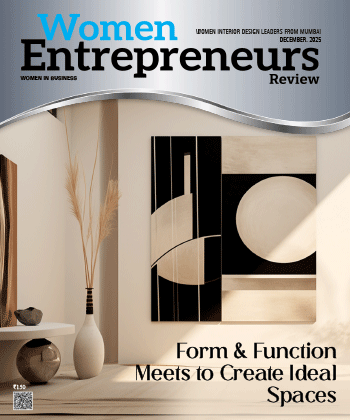
UKIERI Launches Women in Space Leadership Programme
By: WE Staff | Thursday, 26 September 2024
The UK-India Education and Research Initiative (UKIERI), the flagship bilateral program on education and research between the UK and India, has launched the Women in Space Leadership Programme (WiSLP) in New Delhi. This initiative aims to develop a women's leadership framework to support institutions in strengthening their gender-inclusive practices and policies, particularly in space sciences and related fields.
WiSLP, launched as part of UKIERI by the Department of Science and Technology (DST) and the British Council— the UK’s international organization for cultural relations and educational opportunities—will be designed in consultation with experts from India. The program aims to foster women's leadership in science and research, with Coventry University (UK) as the delivery partner.
This program is built on three foundational pillars to promote the equitable distribution of leadership opportunities and enable a workplace that recognizes female leaders. Intersectionality understanding of different aspects of women’s identities. Collaborative, culturally sensitive approaches that respond to the unique opportunities and challenges in India. Leadership theory, which utilizes social science and STEM insights to help female scientists gain confidence in their leadership abilities.
Furthermore, the framework will provide a strategic leadership briefing to present recommendations to higher education policymakers and leaders. Focusing on capacity building for 250 early career researchers (ECRs), to become better equipped to take up leadership roles and navigate gender biases and associated barriers. The programme will incorporate mechanisms for networking, awareness-building, and peer-to-peer mentoring. It will enhance the capacity of the women leaders beyond the scope of the programme by developing sustainable initiatives including training the trainers and developing online resources.
Dr Vandana Singh, Head, WISE-KIRAN, Department of Science and Technology, stated “We are very happy to launch WiSLP to strengthen gender-inclusive practices in space sciences and allied fields. As India is investing hugely in Space science and allied areas, there are immense opportunities for women researchers to become role models. It’s the time when we should encourage and promote those women who are working in this area and also are at the Early Career Research level. We will work with the British Council and Coventry University to provide mentoring and leadership development opportunities for women researchers, ensuring a stronger, more diverse representation in science and research. By building a robust support network, we aim to enhance scientific productivity while integrating a gender perspective into critical areas like remote sensing, astrophysics, and telecommunications, among others.”
Michael Houlgate, Deputy Director India, British Council, said, “The British Council is delighted to collaborate with the Department of Science and Technology, Government of India to launch The Women in Space Leadership Programme and we are happy that Coventry University is partnering with us on this important initiative. By supporting women in leadership roles, we hope to create transformative impacts at both the institutional and individual levels. Over the years, UKIERI has facilitated over 25,000 academic exchanges across 4,500 educational institutions, strengthening collaboration across research and industry sectors between India and the UK."
Elena Gaura, Associate Pro-Vice-Chancellor (Research) at Coventry University, said: “Coventry University is honored to collaborate with the British Council and India's Department of Science and Technology on this transformative leadership development initiative for women in STEM and space sciences. By fostering interdisciplinary collaboration and emphasizing an intersectional approach, this project will empower future female leaders, both in the UK and India, to navigate and overcome institutional challenges. Together, we are committed to advancing gender equality, enhancing scientific innovation, and building strong, inclusive academic frameworks that will impact generations to come."
Most Viewed
- 1 Women's Health Startup HerMD Closing Doors Amid Industry Challenges
- 2 5 Famous Women in Indian Armed Forces
- 3 Saudi Women No longer Require Male Permission for Clothing Choices, says Prince MbS
- 4 Kolkata Medtech Startup Innovodigm Raises Rs 5.5 Crore Seed Funding Led by IAN Group
- 5 Yamunanagar's Kashish Kalra Honoured after Securing 111th Rank in UPSC Civil Services Exam
- 6 Madurai Appoints Its First Woman Corporation Head
- 7 IAS Vijayalakshmi Bidari Appointed as the new Nagpur Divisional Commissioner
- 8 American Entrepreneur Lucy Guo Overtakes T Swift to become Youngest Female Billionaire
- 9 ICC Women's World Cup 2025 Trophy Showcased at Indore's Holkar Stadium
- 10 Aparna Saxena's Beauty Venture AntiNorm Launches in India
- 11 Vidya Nataraj Co-Founded BlueStone Jewellery & Lifestyle files IPO
- 12 5 Women Freedom Fighters of India
- 13 Dr. G Krishnapriya appointed as CEO for Trichy
- 14 M3M & Sirona Partner to Introduce Menstrual Hygiene Vending Machines in 15 Locations
- 15 Punjab Govt launches SHE Cohort 3.0 Supporting Tech-led Women Startups
- 16 Indian origin Lawyer, Sweena Pannu appointed as the US New Superior Court Judge
- 17 The Aurora Tech Award recognizes 4 Indian Women-led Startups
- 18 Kerala's Republic Day parade featured an all-female tableau
- 19 Manisha Kabbur Becomes Karnataka's First Woman International Karate Coach
- 20 Director K. S. Ravikumar's Daughter Maalica Ravikumar Launches Life Coaching Company 'Evergrowth Academy' for Women
- 21 Leezu's Raises Pre-Seed Funding to Accelerate Growth in Sexual Wellness Industry
- 22 Sattu: Super-easy summer drink for PCOS gut healing
- 23 Swathi Nelabhatla creates Sitha App, India's First Women-Exclusive Gig Platform
- 24 7 Timeless Female Kathak Dancers & their Iconic Legacies
- 25 Meet 7 Iconic Women Architects of Modern India & their Most Impactful Work
- 26 This Woman-led Insuretech Startup is Helping Bridge the Education Financing Gap in India
- 27 Women Leaders Share Lessons Learnt from India Women's WC Win
- 28 5 Enterprising Women Founders Powering Singapore's Tech & Innovation Landscape
- 29 4 Women. 4 Stories. One Vision for Smarter, Stronger Healthcare
- 30 Global Gender Gap Narrows to 68.8%, But Full Equality 123 Years Away: WEF Report 2025
- 31 Changemakers: 7 Women Entrepreneurs Taking the Make in India Movement Forward
- 32 Meet Lucy Guo, The Youngest Self-Made Female Billionaire Disrupting Tech
- 33 How Women are Driving India's Festive Online Shopping Surge






